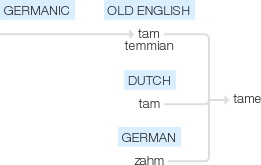Tame
Old English tam (adjective), temmian (verb), of Germanic origin; related to Dutch tam and German zahm, from an Indo-European root shared by Latin domare and Greek daman ‘tame, subdue’.
wiktionary
From Middle English tame, tome, weak inflection forms of Middle English tam, tom, from Old English tam, tom(“domesticated, tame”), from Proto-West Germanic *tam(“tame”), from Proto-Germanic *tamaz(“brought into the home, tame”), from Proto-Indo-European *demh₂-(“to tame, dominate”). Cognate with Scots tam, tame(“tame”), Saterland Frisian tom(“tame”), West Frisian tam(“tame”), Dutch tam(“tame”), Low German Low German tamm, tahm(“tame”), German zahm(“tame”), Danish tam(“tame”), Swedish tam(“tame”), Icelandic tamur(“tame”).
The verb is from Middle English tamen, temen, temien, from Old English temian(“to tame”), from Proto-West Germanic *tammjan, from Proto-Germanic *tamjaną(“to tame”).
From Middle English tamen(“to cut into, broach”). Compare French entamer.
etymonline
tame (adj.)
early Middle English tame "in a state of subjection, physically subdued, restrained in behavior" (c. 1200); of animals "domesticated, reclaimed from wildness," also, of persons, "meek, gentle-natured, compliant, intent on homely or domestic activities" (mid-13c.), from oblique forms of Old English tom, tam "domesticated, docile," from Proto-Germanic *tamaz (source also of Old Norse tamr, Old Saxon, Old Frisian, Middle Low German, Middle Dutch tam, Old High German zam, German zahm "tame," Gothic tamjan "to tame"), from PIE *deme- "to constrain, to force, to break (horses)" (source also of Sanskrit damayati "tames;" Persian dam "a tame animal;" Greek daman "to tame, subdue," dmetos "tame;" Latin domare "to tame, subdue;" Old Irish damnaim "I tie up, fasten, I tame, subdue").
A possible ulterior connection is with PIE *dem- "house, household" (see domestic (adj.)). Meaning "spiritless, weak, dull, uninspiring, insipid" is recorded from c. 1600. Related: Tamely; tameness.
tame (v.)
mid-14c., from tame (adj.), or altered by the form of the adjective from Old English temian "subdue, make tame," from Proto-Germanic *tamjan- (source also of Old Norse temja, Old Frisian tema, Middle Dutch temmen, Old High German zemmen, German zähmen, Gothic tamjan). Related: Tamed; taming.
